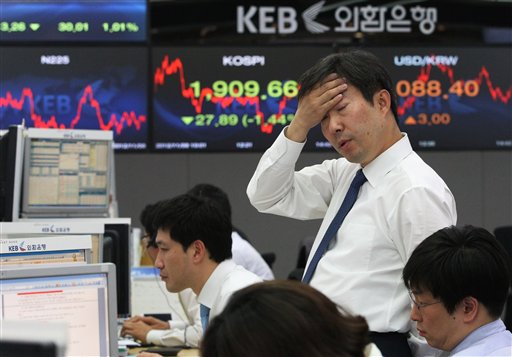(AP) European markets underperform as strikes hit
By TOBY STERLING
AP Business Writer
AMSTERDAM
World stock markets were mixed Wednesday, with European indexes down as strikes swept across much of the continent while Asian shares rose as China neared the climax of a once-a-decade leadership transition.
Unions coordinated work stoppages across many southern European countries to protest the austerity measures that governments have been imposing to reduce public debt. Factories and railways were shut in many countries, with a general strike in Spain in the automobile, energy, shipbuilding and construction industries. Flights were delayed around the continent due to transportation strikes.
The increasing popular resistance to austerity raises some fears that governments will have an increasingly difficult time imposing the policies needed to restore their finances.
Meanwhile, the economy keeps weakening. Official figures showed industrial output in the 17-country eurozone dropped 2.5 percent on the month in September, worse than analysts had expected.
By late morning in Europe, Britain’s FTSE 100 was down 0.5 percent to 5,755.61. Germany’s DAX was 0.1 percent lower at 7,160.64 and France’s CAC-40 shed 0.1 percent to 3,427.42.
In Asia, investors heralded the leadership transition taking place at China’s Communist Party congress this week. On Wednesday, President Hu Jintao stepped aside to make way for Vice President Xi Jinping as party leader. Traders were hopeful that the transition will be followed by greater initiatives to shore up China’s listless economy.
Hong Kong’s Hang Seng jumped 1.2 percent to 21,441.99. Mainland Chinese shares also gained, with the Shanghai Composite Index rising 0.4 percent to 2,055.42. The Shenzhen Composite Index gained 0.3 percent to 818.60. Japan’s Nikkei 225 rose marginally to close at 8,664.73
Wall Street also appeared headed for gains on the open as renewed efforts got under way in Washington to resolve the impending “fiscal cliff.” Dow Jones industrial futures rose 0.5 percent to 12,782 and S&P 500 futures added 0.6 percent to 1,378.50.
The “fiscal cliff” is a set of U.S. government spending cuts and tax increases that will take effect automatically at the beginning of next year unless U.S. leaders reach a compromise before then.
Unless Congress acts, all Bush-era tax cuts would expire, raising 2013 tax bills for most Americans. Obama wants to end those tax cuts only for households making more than $250,000 a year while Republicans oppose all tax rate increases.
Worries about the impasse pushed U.S. stocks to one of their worst weekly losses of the year last week.
U.S. lawmakers gathered for talks on Tuesday, giving traders hope that at least a temporary compromise might somehow be reached before a deadline in seven weeks. President Barack Obama was to meet later Wednesday with about a dozen business executives who want to see an agreement before the end of the year.
In other markets, Australia’s S&P/ASX 200 gained 0.2 percent to close at 4,388.40. South Korea’s Kospi brushed off earlier losses to rise 0.2 percent to 1,894.04.
Benchmark oil for December delivery was up 14 cents to $85.52 in electronic trading on the New York Mercantile Exchange. The contract fell 19 cents to finish at $85.38 per barrel on the Nymex on Tuesday.
The euro rose to $1.2742 from $1.2705 late Tuesday in New York. The dollar rose to 79.94 yen from 79.41 yen.

COMMENTS
Please let us know if you're having issues with commenting.